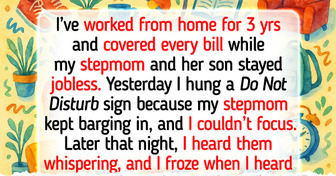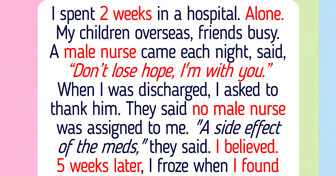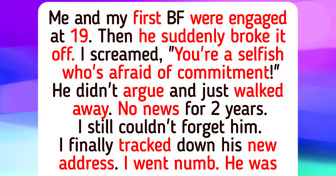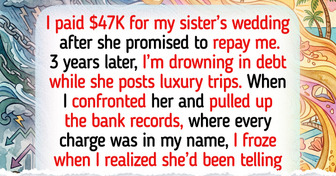nice
8 Speaking Mistakes That Might Make People Run Away From You

Devaluing someone means breaking their personal boundaries. Sometimes it’s better to keep silent rather than say certain things to people, even though they might seem harmless and even encouraging. Phrases like, “What are you reading?” or “Still the same thing?” or “It’s about time you shifted to scientific literature!” might seem innocent, but can cause a feeling of irritation to grow inside someone. Because by saying this, the opponent downgrades the interests of their interlocutor and even offers to replace them with their own ideas.
Bright Side collected the most widespread phrases that make communication awkward. Of course, people are free to express their thoughts and feelings the way they want to, but still, being a bit more attentive to people you speak to is definitely something worth considering.
“You should’ve thought about that before.”
There are many things we can’t foresee in life. It’s impossible to know in advance whether you might stop liking the specialization you’ve chosen or if your significant other will start behaving differently than they used to. Everyone makes mistakes. So why not show more patience to people and relate to different situations with a pinch of humor?
“Of course, my kid will share their toys.”
Imagine your adult relatives taking your favorite bag or long-awaited car and giving it to another person while saying, “She is not stingy. Of course, she’ll share it!” Wouldn’t you feel angry? Now try to imagine how a little kid, who can’t control their emotions, feels. By the age of 3, kids start to feel that they are holistic personalities, which is why it’s necessary to ask their permission when playing with their toys. And if the kid says, “no,” they mean “no.” It’s in childhood that a person learns to protect their interests and borders properly.
“He’s not Brad Pitt, but whatever.”

The other version is, “She’s no Angelina Jolie, but she’s really nice.” When others criticize people’s appearance, it’s too much. If you hear comments regarding the way you look or the way your beloved looks, it’s better to stop them immediately. This is because attacks like these are better off being nipped in the bud and stopped from the very start.
“What kind of nonsense are you watching again?”
So you can’t wait to watch that freshly-released horror movie or another season of your favorite TV series. You finally get the chance and get yourself cozy on the couch when one of your family members suddenly says in the middle of the movie, “Ah, you’re watching this silly stuff again!” Yes, we all have different tastes, but it’s not okay to devalue other people’s interests. An adult is free to watch whatever they want. If you have teenagers or kids at home, it’s good to have family evenings where you watch interesting programs or family movies together.
“You’d look better if ...”
These phrases can be mistakenly taken for a harmless joke or constructive criticism, but that’s where the danger hides. This is neither a joke, nor is it constructive criticism — it’s a humiliating thing to say. After hearing a few of these phrases, the listener can easily develop issues with their self-esteem. It’s important to learn to notice these comments and react to them correctly.
“We raised you without diapers somehow.”
It’s a good thing that most of modern society recognizes the fact that postpartum depression exists. But recognizing it doesn’t mean understanding it and showing compassion. Here is a short list of what a tired woman might hear, “What did you expect after all?” or “Why are you tired? You are at home all day long.” or “Is your kid still wearing diapers?” Sometimes a request for help to wash a pile of baby clothes and remove all the stains at home, after the baby spends the entire day without diapers, has a sobering effect on these “well-wishers.”
“How do you manage to live in such a small apartment?”
“When are you going to move to a bigger apartment?” “Are you sure you’ll fit in here?” “What a small storage room!” With just a few words, your years of effort aimed at buying your own apartment become insignificant, and the joys of buying it disappear. This means that the person devaluing your achievements and purchases is using a defense mechanism that helps them save themselves and avoid contact with intolerable feelings. For example, if it’s difficult to feel happy for a person or admit that you envy them, it’s easier to offend that person and devalue all of their efforts, thus proving to yourself that there’s nothing to envy.
“Is that your whole salary?”
“You are a man! Is that all you’ve earned?” or “You don’t earn much at your work, it might be better to stay home and do the housekeeping!” If you keep hearing these “encouraging” phrases from your close friends, it’s a red flag. These words can easily make you doubt your own achievements. We all might have failures and our loved ones should support us and try to help us restore our self-confidence.
Which unpleasant phrases do you keep hearing? How do you usually react to them?
Comments
Related Reads
6 Hairstyles for Your Nose Shape

An Artist From New Zealand Shows the Little Things Most Loving Couples Do, and They Look So Familiar

26 Absolutely Ordinary Photos If You’re Not Paying Attention to the Background

23 Highly Misleading Photos That Make Us Look Twice

20+ People Who Just Wanted to Take a Picture but Got a Renaissance-Like Masterpiece

I Refuse to Be Treated Like a Servant in My Own Home, So I Had to Draw the Line

A Stranger Humiliated My Daughter at Disney World—He Picked the Wrong Mom to Mess With

15 Quiet Moments of Kindness That Made the Biggest Impact

10 Stories That Prove Kindness Has Healing Power When the World Seems Unfair

11 Stories That Prove First Love May Be Short, but Leaves a Lasting Mark Forever

I Refuse to Let My Brother’s Girlfriend Control My House—I Put a Stop to It Fast

I Refuse to Let My Sister Get Away Without Repaying My Money, I’m Not Charity







